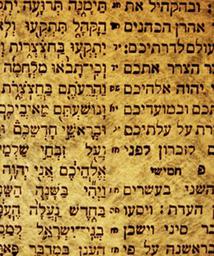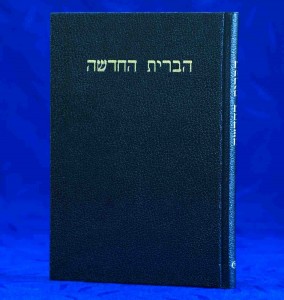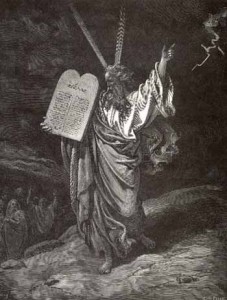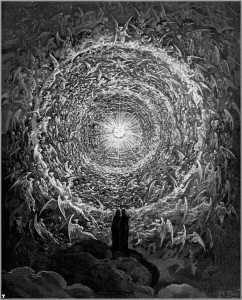 FIrst Interview of two in the “Monotheism and the Hebrew Bible” Series
FIrst Interview of two in the “Monotheism and the Hebrew Bible” Series
Interviewee: Dr. Nathan MacDonald
– Reader in Old Testament at University of St. Andrews and Sofja-Kovalevskaja-Preis Team Leader, Georg-August Universität Göttingen
– Author of “Deuteronomy and the Meaning of ‘Monotheism’”
1. How do we define “monotheism”?
The dictionary definition of monotheism is “the belief that there is only one God”. So far so good, but this is where the difficulties begin, as we can see if we examine the different parts of the definition.
First, “the belief”. The focus on beliefs rather than practices is striking and suggests that the conceptuality of monotheism may better capture intellectual paradigms than the larger religious framework, which consists of more than beliefs. Practices and beliefs are linked in a complex manner, of course, but some of the evidence we have about ancient Israel is much more readily related to practice rather than belief.
Second, “there is”. The issue becomes primarily, if not entirely, one of ontology. Issues of response are marginalized, if not excluded entirely. These issues of response are of much greater weight for the ancient authors and editors of the Old Testament.
Third, “one God”. What do we mean by a God, especially if we are going to deny that others exist? Is belief in other supernatural beings, such as angels or demons, not monotheistic? (Supernatural is itself a problematic category, of course).
Fourth, “only”. The “only” in such a definition is usually taken to mean the denial of the existence of other gods. Where this is not present, do we still have monotheism? (And if no, have we narrowed down our texts with what is merely a formal category?) How do we judge if such denials are rhetorical?
All of this suggests that monotheism is a remarkably difficult concept. That doesn’t mean barring its use as some have suggested – such strictures would be readily ignored anyhow! But in describing the beliefs and practices in the ancient Near East, including the Levant, we need to ensure we know what we are doing when we employ such categories, and most particularly ensure we don’t smuggle things into our description of ancient religions. In other words, the hermeneutical issues that circle around the monotheism debate are rather complex.
2. In the text of the Hebrew Bible, do you see a progression or development to monotheism? If so, is that progression a development in kind or a development of degree (or both)?
The question of progression or development is more naturally suited to a discussion of Israelite religious history, rather than the ‘text of the Hebrew Bible’ per se. The texts of the Hebrew Bible evidence an insistent monolatry, or call it monotheism if you wish. These take a variety of different forms, such that I have occasionally spoken of early Jewish monotheisms, a coinage that is meant to parallel the use of Judaisms in recent scholarship on the Second Temple period. Thus, the monotheism of Deutero-Isaiah and the priestly document look very different from one another, even if they stem from the late neo-Babylonian or early Persian period. This diversity only increases if we consider Jewish wisdom literature or Jewish apocalyptic. These are also arguably monotheistic, but quite different from Deutero-Isaiah and P. In this sense, I would like to speak of the variety of monotheism in the Hebrew Bible, rather than its progression or development.
3. (If yes to the previous question) Are there distinct periods in which you see these developments (a timeline of sorts) and how would you characterize or describe the shifts in thinking or praxis?
This sounds to my ears like a different issue: one relating to religious history. The biblical texts are some of the evidence one might utilize, but sits alongside archaeological finds, inscriptions, finds from Mesopotamia etc. The biblical text can provide some evidence of earlier beliefs and practices – this is perhaps what you were looking for in the previous question. By critical analysis earlier perceptions and ideas may be discernible behind the final monolatrous or, if you prefer, monotheistic perspective of the Hebrew Bible.
I do think there are noticeable shifts at certain periods, but these should not be over-exaggerated. In particular, there may be more continuity between practice and belief before and after the neo-Babylonian period (the “exile”). I also think that the kind of diversity that I see in the Persian period makes it difficult to construct timelines of the sort you request.
It makes most sense to work back from latest to earliest. I am persuaded by Larry Hurtado that the Maccabean revolt marks an important step in the consciousness of Jewish uniqueness vis-à-vis Greek and other Levantine religions. That is, there is a strong sense amongst Jews and non-Jews that Judaism is other, particularly in its aniconic practice and cultic devotion to one God. Earlier in the Second Temple period there is more willingness to relate YHWH to other chief deities, although programmatic aniconism and insistence on YHWH-alone devotion are already strong. The significant changes in this period probably relate to a growing scripturalization – including the move towards harmonization as consistent with the revelation of one deity – and the emphasis on YHWH as Torah giver. In the neo-Babylonian period and earlier there are monolatrous tendencies, but these do not result in the exclusion of other deities in the religious practice of some. For earlier periods we are more and more reliant on archaeological and comparative evidence. It seems likely that worship of YHWH and El predominated, though it is uncertain when they were seen as the same deity. There was probably a pantheon, though on a far small scale than could be found in Mesopotamia.
4. Is the distinction between “polytheism” and “henotheism” necessary or helpful?
Henotheism is a difficult term precisely because it has been used by a variety of people in a variety of ways. I would need to know what idea of henotheism was being deployed before determining if this could be helpfully distinguished from polytheism. It should be said, of course, that many issues have been raised about the application of the term polytheism. Not least of these, is that polytheism is an inner-monotheistic way of characterizing other religions and does not accord that well to what “polytheists” hold to be important about their practices and beliefs. Max Müller’s coinage of henotheism (“there is a god”, rather than “there is one god”) was a partial attempt to address this issue, though I think its success was decidedly limited.
5. What major texts are central to your view and why?
My own interests are in describing the religious practices and beliefs of biblical writers in the round. In that sense there is no text that is not important. In particular, I’d want to say that there may be dangers in focusing on only the classic texts, such as Deut 6.4; Isa 40-48; Deut 32.8-9; Judg 11; Ps 82. These are much discussed because they are complex and interesting texts with a fascinating history of research. Nevertheless, it is here that our definition of monotheism may have overly determined the material for analysis. Our definition focuses on particular issues, and so narrows down the texts we examine.
6. What major texts are the most problematic to your view and why?
Sorry, I don’t understand the question.
More seriously, one tries to work with models that integrate all the material. When other scholars raise problematic texts it is necessary to go back and see how they might fit, or how the models need to change. My speaking of early Jewish monotheisms is at least partially an attempt to recognize the complexity of the evidence with which we are presented. It seeks to offer a comprehensive model, without being reduced to a linear development.
7. What would be the top 3 books you would recommend to students interested in the study of characterizing the kind of theism in the Hebrew bible/OT and ancient Israelite religion?
Mark Smith – The Origins of Biblical Monotheism. Smith’s work is very widely informed, but also depends upon careful, close reading of biblical and non-biblical texts. The first few chapters of Origins I think are particularly important for the penetrating questions they ask. I’m a little hard pressed here to choose between it and God in Translation, which I think breaks significant new ground. For orientating students to the debate about monotheism Origins gets the vote with the encouragement to go on and read God in Translation.
Fritz Stolz – Einführung in den biblischen Monotheismus. Like Smith has a broad canvas which is especially helpful for those orientating themselves to this debate. I think his reflections on post-exilic monotheism at the end of the book point out where new work needs to be done. It would also be a good introduction to the world of German scholarship where so much important scholarship is to be found: I think of the early work in the 1980s that brought the subject of monotheism into the centre of academic discussion, as well as the work of the Fribourg School on iconography.
Benjamin Sommer – The Bodies of God and the World of Ancient Israel. A lengthy appendix provides a synthetic overview of monotheism in ancient Israel. Sommer reflects the influence of Yehezkel Kaufmann and so views the discussion rather differently from many other scholars. This would give students a sense of the different flavors of scholarship, which would be no bad thing. It might also encourage them to read Kaufmann who puts his finger on significant issues, even if his proposals were so often implausible.
 For your listening pleasure, here is a version of Kumi Ori. One of the biggest steps in learning a new language is training the ear. Listen to as much as you can, as often as you can. The lyrics to the song are Isaiah 60:1-2. You can find the lyrics here.
For your listening pleasure, here is a version of Kumi Ori. One of the biggest steps in learning a new language is training the ear. Listen to as much as you can, as often as you can. The lyrics to the song are Isaiah 60:1-2. You can find the lyrics here.





 Apparently, God’s love is so important that to talk of Jesus’ father blinding people so that they won’t see bordered on heresy. It is like everyone gladly acknowledges, in theory, God’s hatred of things (or people) yet we must never speak of it; It’s there but never comes into play — like the dark side of the moon. This hermeneutical insistence among Christians (that I know either personally or through forms of media) has always puzzled me.(I can’t think of a way that deliverance can be accomplished apart form judgment.) But, since I do not share the need to expunge hatred from God I will present the case for YHWH (or Jesus’ Father) as being the referent for this phrase. (Please note: I am not saying YHWH has to be the referent but, he could be the referent.)
Apparently, God’s love is so important that to talk of Jesus’ father blinding people so that they won’t see bordered on heresy. It is like everyone gladly acknowledges, in theory, God’s hatred of things (or people) yet we must never speak of it; It’s there but never comes into play — like the dark side of the moon. This hermeneutical insistence among Christians (that I know either personally or through forms of media) has always puzzled me.(I can’t think of a way that deliverance can be accomplished apart form judgment.) But, since I do not share the need to expunge hatred from God I will present the case for YHWH (or Jesus’ Father) as being the referent for this phrase. (Please note: I am not saying YHWH has to be the referent but, he could be the referent.)







